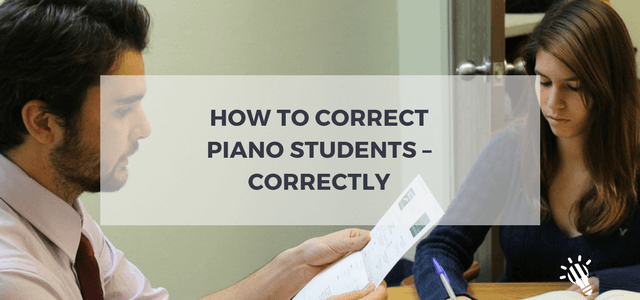
An advanced amateur pianist, Frances Wilson runs a popular private piano teaching practice based in her home in SW London, UK. She writes a regular blog on pianism, teaching and music (www.crosseyedpianist.wordpress.com), and is a reviewer for Bachtrack, an international concert listings site (www.bachtrack.com).
Frances is currently studying with Penelope Roskell, acclaimed British concert pianist and professor of piano and piano pedagogy at London’s Trinity-Laban Conservatoire of Music and Dance.
We are so glad to welcome her to staging.topmusic.co for this guest post. Take it away!
There’s a wrong way and a right way to correct piano students mistakes.
I hope I am doing it the right way….
Continually picking up a student over small slips and errors will dent their confidence and erode their ability to trust their musical self.
Teaching a student how to identify errors, by ear and by feel, and how to learn from them is crucial. If a student stumbles over a passage but cannot point out where the error happened, they need to be shown where and why the mistake occurred.
“Listen to yourself playing” I tell my students, and they look at me slightly askance. Of course you must use your ears when you play, just as you use your brain, your fingers and your eyes.
A good teacher knows each student individually, can remember where they are in their study, and adapts his or her teaching style to suit each student. A bad teacher cannot remember names, or the student’s progress, and teaches every student in exactly the same, formulaic way.
A good teacher allows the student to play through the entire piece first, without interruption. A good teacher listens critically and supportively.
When the student has finished, a good teacher first points out the places where the student played well and praises the student for his or her playing. Then the serious work begins.
A bad teacher halts the student mid-way to highlight errors or correct mistakes.
This is a very bad habit, as it encourages ‘stop-start’ practising and a message is sent to the student’s brain that this is an acceptable way of playing, even if the student (and the teacher!) knows it is not.
In a performance or examination situation, stopping and starting is not acceptable, but if a student becomes accustomed to doing it in practice (reinforced by teacher’s behaviour during lessons), he or she does not learn a coping mechanism for quick recovery when a mistake occurs. Mistakes need to be seen in context, and understood, but students should also be encouraged to “play through” errors.
One of my students, in fact, a student who has been with me the longest, a competent 11-year old called Lucy, still often asks me when she is playing “is this right?”. Most of the time she is right, and me keeping quiet, or simply saying “keep going, we’ll talk about it in a moment”, is enabling her to trust her musical instincts and work out problems for herself.
A good teacher encourages students to think for themselves, work out their own fingering schemes, and helps them to see solutions to problems. A bad teacher just tells them how to do it without allowing any forum for discussion or feedback, thus ridding the student of any sense of control over the music, and making the student entirely reliant on the teacher (who may not always be right!).
A good teacher encourages students to see how a particular technique learnt in one piece (see my earlier post on technical exercises) can be applied to another. A bad teacher says “You will do it this way. Or else….”
Sometimes even the youngest student has something fresh and insightful to say to me about the music they are learning. And when I pass on such an anecdote to my teacher, I realise that we are all connected in an infinite circle of learning and mentoring.
Here are some fantastic resources to use if you would like to continue to learn about this topic.
What techniques do you find work well when correcting your students? Please leave your questions and thoughts in the comments section below.
